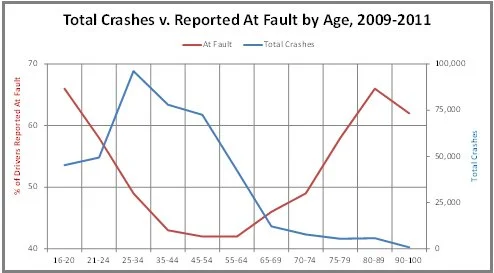Senior Drivers
Operating a motor vehicle is one the most complex and risky activities that ordinary persons regularly engage in. Driving risks are high for both the young inexperienced driver and the older driver. The American Automobile Association (AAA) states that, as a group, senior drivers are at a higher risk of having a serious collision per mile driven than any other age group except for those under age 25.
Drivers age 85 and older are injured or killed in crashes at a higher rate than any other age group. I have found that most of my older patients are good drivers. However, medication use and age-related diminishing visual, physical and mental abilities affect each driver in different ways.
One of the most difficult discussions I have with my patients involves when to stop driving. Often an event such as an accident, traffic citation or medical condition such as a stroke will precipitate the issue. Sometimes a family member will contact me, based on their observation of my patient's declining functional ability or memory. The Hartford Insurance Company is one of several sources of guides for senior drivers and their families for conversations about limiting driving.
I discourage patients & families to come to the office to be "tested" for ability to drive safely. Tests of cognitive function predicting driving ability are inconsistent. Researchers found that single cognitive tests predicted the driving ability of people with dementia only 46 percent of the time. More comprehensive evaluations are more useful. Many Occupational Therapists have specialization in evaluating drivers physically & cognitively. The American Medical Association and National Highway Safety Administration collaborate on an office guide to evaluating senior drivers. Florida State law allows anyone to report an unsafe driver:
Any physician, person or agency having knowledge of a licensed driver’s or applicant’s mental or physical disability to drive may report the person to the Department of Highway Safety and Motor Vehicles (DHSMV). Forms are available on the DHSMV Web site, as well as at local driver license offices.
The real challenge is engaging the senior driver in the evaluation, and getting their agreement to cease driving if prudent. Losing the independence driving provides is upsetting, and has very real consequences on the senior driver's day-to-day life, especially in Central Florida. Although alternative means of transportation are available, they can be both costly and inconvenient. Keeping the older driver behind the wheel is sometimes the best option. Several initiatives may help, now and in the near future.
Older Driver Training. AARP Smart Driver classroom instruction and online courseteaches evidence-based strategies to improve driver awareness of medication effects and compensate for age-related physical limits. Insured drivers age 55 and older may receive reduced insurance premium for three years after completing the course. Likewise AAA, which pioneered driver training in 1935, has both online & classroom programsthrough local AAA affiliates. The Florida Department of Highway Safety and Motor Vehicles has a complete listing of local training courses for older drivers.
Exercise. Recent research tracked experienced drivers ages 60-74 as they followed a physical fitness program for 15-20 minutes per day over eight to 10 weeks, focusing on flexibility, range of motion, strength and coordination. Interesting, the training was done using Microsoft Kinect for Xbox systems! Findings showed improved driving-related movements that many older people find challenging, such as turning their head and body to look behind when backing up, getting in and out of the car, and seeing blind spots when changing lanes.
Cognitive Training. A 10 year medical study at Penn State University, including 2,000 drivers age 65 and over, showed that a training program involving reasoning, memory, and divided attention kept seniors driving longer. Two commercial companies, DriveSharp and DriveFocus, offer online or software based cognitive training programs. I can't tell from my brief investigation whether these programs will be useful.
Technology to Assist Older Drivers. Ongoing research by the Hartford Insurance Company and MIT shows that more than three quarters of drivers older than 50 who plan to purchase a new car will be looking for advanced safety technologies, believing that this may allow them to drive safer and longer. Crash mitigation systems, adaptive cruise control, adaptive headlights, blind spot and lane departure warnings are being introduced rapidly in newer models. It remains to be seen what impact advanced safety measures will have on older drivers' limitations -- the promise of autonomous vehicles may have been set back by recent mishaps. For the present, I recommend additional driving instruction and better fitness by exercise. Cognitive training, if it becomes widely available outside a study environment and available software produces verified improvements, offers an exciting new option.


